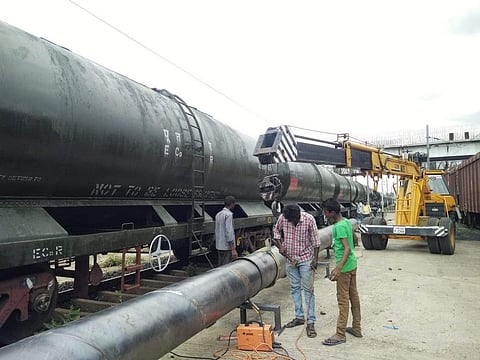

VELLORE: A 50 wagons train carrying 2.5 million litres of Cauvery water will leave from Jolarpet in Vellore district on Friday morning to qench thirst of scarcity-struck Chennai.
Top Railway officials made a final inspection on Thursday at the yard where the wagons were stationed.
“All the arrangements have been completed. The wagons are filled with water. Everything is in ready mode, will start transporting water from Jolarpet to Chennai on Friday morning,” a senior official of Tamil Nadu Water Supply and Drainage (TWAD) Board told Express on Thursday.
The day witnessed some anti-climax scene as the water loaded into certain wagons had to be drained as they exceeded the permissible levels leaving the TWAD Board officials and workers disappointed.
The permissible level for a wagon is a maximum of 50,000 litres of water. As many as 27 wagons were filled with more water, sources said. The Railway officials during checking found the wagons exceeding the limits and directed the TWAD Board officials to drain the excess water.
The actual plan was to move water early in the morning, as the project hit a few road block in the way of leakages, sources said, adding once the glitches were set right, the green signal from top authorities of Tamil Nadu government was not received to move the wagons on Thursday.
The plan got changed since the government has been arranging for a function to receive water at Chennai Metro Water facility in Villivakkam on Friday, the sources said.
Tamil Nadu Chief Minister Edappadi K Palaniswami went into a huddle with top government authorities and ministers to discuss the matter.
Meanwhile, Additional Divisional Railway Manager Abishek Varma and Senior Section Engineer Ganesan made a final inspection at the yard and the wagons. They expressed satisfaction after the inspection.
Cauvery water is drawn from the Chekkanoor barrage down the Mettur dam for supplying several parts of Vellore district under Vellore Combined Water Supply Scheme, for which an underground storage with a capacity of 5 lakh litres is located at Mettusakkarakuppam.
Now, the wagons will be filled with water pumped from the underground storage through newly laid pipeline to the railway yard at Parsampet in Jolarpet station premises.
Tamil Nadu Chief Minister Edappadi K Palaniswami made the announcement for ferrying water to quench the thirst of parched Chennai city on June 21 and sanctioned funds to the tune of Rs.65 crore.
Top officials TWAD, Chennai Metro Water Supply and Sewerage Board and Railways inspected the underground storage tank, pump house and the yard on the next day.
Subsequently, a project report was prepared and submitted to the concerned top authorities of the government before launching the spade work on June 27. The pipe laying works were started in full swing on July 3 and completed early on July 10, sources said.
For filling 50 wagons with 2.5 million litre of water, it will take 3.30 hours. The actual plan is to transport 10 million litre water per day to Chennai.
However, only 50 wagons are available with the Railways as of now. One more rake will shortly be availed to make four trips a day to ferry water which will be decanted at Villivakkam where from will be pumped to the treatment centre at Kilpauk before being flown down the pipes to reach the households.
Of the total amount of Rs. 65 crore, 54.40 crore is being paid for the Railways to transport the water. For each trip, Rs. 8.6 lakh is to be paid for the Railways. The high cost of transportation has led many an eyebrows raise; it was also discussed at high level meeting of top officials. But given the prevailing crisis in Chennai, they see no other option, the sources noted.
A team of 3 Executive Engineers, 5 Assistant Executive Engineers and four Assistant Engineers are pressed into service for the contingent project, besides 200 labourers working day and night.